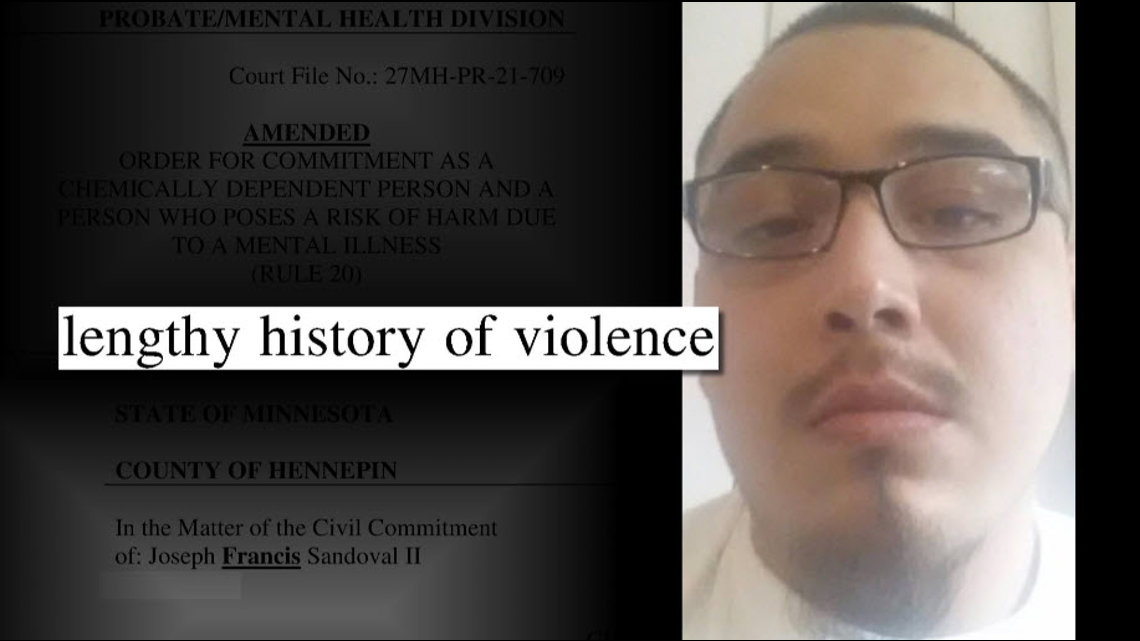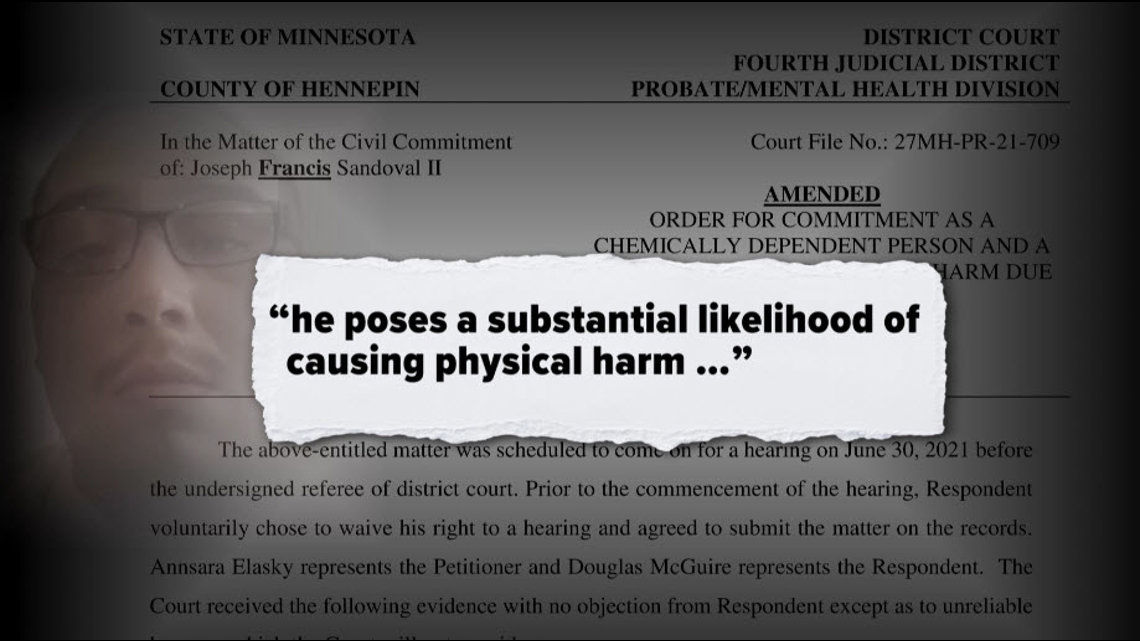ST PAUL, Minn. — The Minnesota Court of Appeals has, on Constitutional grounds, overturned Ramsey County Judge Joy Bartscher’s ruling that barred KARE 11 from reporting on a key court memo that describes mental health treatment failures before a high-profile double murder.
The memo reveals that before he murdered two innocent men in a psychotic rage, Joseph Sandoval’s treatment providers knew he had relapsed – and was experiencing “hallucinations and delusional thoughts” – yet failed to revoke his provisional discharge from a locked state psychiatric treatment program.
“It would be a mischaracterization to say Mr. Sandoval was alone in responsibility for this loss of life,” his defense attorney wrote.
Sandoval was provisionally discharged from the locked treatment facility due to “staff shortages,” according to medical records cited in the Sentencing Memorandum filed by defense attorney Baylea Kannmacher.


Before the murders occurred in an unsupervised sober home, Kannmacher said Sandoval’s treatment providers knew he was “non-compliant with his anti-psychotic medications,” was using illegal drugs again, and that “psychiatric intervention at a higher level” had been recommended.
Despite repeated red flags, Sandoval’s provisional discharge was not revoked. His lawyer argued the murders were triggered because “his paranoia was fueled by his unmedicated mental illness and substance abuse.”
After the murders, Sandoval told police he heard voices from the TV saying they were going to kill him, according to the criminal charges.
Evergreen Recovery’s role
Despite his well-documented history of violence and court orders that the Commissioner of the Department of Human Services hold him “safe and secure,” records show Sandoval was released and sent to an outpatient treatment program at Evergreen Recovery in St. Paul.
The FBI recently raided Evergreen Recovery – and a federal judge froze its assets – amid allegations the company was billing for addiction recovery services not provided.
The government raid came in the wake of KARE 11's multi-part "Recovery Inc." investigation which exposed Evergreen owners David Backus and Shawn Grygo living a lavish lifestyle – with expensive cars and travel on private jets – as their company billed tens of millions to taxpayer-funded Medicaid for services clients and employees said were not always provided as claimed.


In requesting a permanent injunction against Evergreen, the U.S. Attorney’s office detailed what it called a “scheme to defraud” by billing Medicaid for substance abuse treatment services that were not provided. According to the filing, investigators estimate that “between 30 to 40 percent” of the hours Evergreen billed for group counseling “are falsified.”
Government investigators estimated the “fraudulent conspiracy” totals “at least $28 million.”
At a hearing last week, Evergreen’s owners denied the allegations of wrongdoing.
‘Gag Order’ reversed
Joseph Sandoval’s defense attorney filed the memo detailing treatment failures on July 16, arguing in favor of a reduced sentence on the murder charges.
KARE 11 found the memo on the court’s public website and planned to report about the failures when Sandoval was sentenced last month.
But Ramsey County Judge Joy Bartscher issued a ‘gag order’ order on July 19, barring KARE 11 from reporting details of the memo and ordering copies be destroyed because she believed it had been filed publicly in error, and contained personal medical information about Sandoval.
KARE 11 delayed its report while the station’s attorneys quickly challenged Judge Bartscher’s order as an unconstitutional prior restraint.
"In this country, prior restraints on the press are presumed to be unconstitutional," said Jane Kirtley, a media ethics and law professor at the University of Minnesota.
In its petition to the Appeals Court, KARE 11 argued that “the Supreme Court of the United States has never held a prior restraint constitutional …”
Read the ruling below.
Meth, Oxy and Opiates
In the memo, his attorney revealed Sandoval repeatedly failed drug tests at Evergreen Recovery.
Prior to the murders – which happened at an Evergreen-affiliated sober home – the memo lists 20 different dates when Sandoval failed drug tests. It says the tests included positives for meth, oxycontin and opiates.
In addition, the memo says Evergreen treatment notes indicate Sandoval “often missed” other drug tests as well as scheduled treatment sessions.
Sandoval’s attorney also raised questions about whether some Evergreen treatment records were falsified. The memo says many notes used “wrong pronouns,” “appear to be copied and pasted” and were signed “days after the date of service listed.”
The memo concludes: “Evergreen Recovery Center was not, and did not, meet the needs of Mr. Sandoval.”
KARE 11 made the editorial decision to redact some sensitive personal information. We kept information already available from his previously filed criminal and civil commitment cases – and information that describes Sandoval’s symptoms and treatment leading up to the murders and to sentencing in the case.
Sandoval’s history of violence
KARE 11’s GAP investigation exposed how Sandoval had a known history of severe mental illness, drug-induced psychosis, and violence – and yet was released without adequate treatment or supervision.
In one case he stole a taxicab, led police on a wild chase and slammed into a pedestrian not once – but twice.
Video from a police helicopter following the chase shows the cab backing up, then ramming into Dylan Swisher a second time.
“You think he was trying to kill you?” KARE 11 asked Swisher.
“Yes, I don’t know how you can come to any other conclusion,” Swisher replied. “He just drives at me. I’m a dude on the ground and he drives directly for me.”
Court records show Sandoval told police he intentionally ran over the man because he believed he was “messing with his sister.” Swisher said he doesn’t even know who Sandoval’s sister is.


Months before he stole the taxi, Sandoval had broken into Bryan Plunger’s North Minneapolis home, smashing through the door and windows with his bare hands.
Sandoval was muttering incoherently and was covered in blood. Plunger said he could tell the man was severely mentally ill. Video shows Sandoval’s blood smeared on the walls and sprayed across the floor and furniture.
“My immediate impression was ‘Whoa, this guy needs some help,’” Plunger told KARE 11.
Sandoval told police that he smoked meth before breaking into the home and was hallucinating, according to court records.
Police took Sandoval to Hennepin County Medical Center, but he wasn’t charged at that time.
Again back on the streets, Sandoval was accused of attacking people with a knife and taken to the county jail, where he was accused in an unprovoked beating of another inmate.
After stealing the taxi, Sandoval was arrested and charged with the earlier North Minneapolis break-in, the inmate assault, and for running over Swisher in the stolen cab.
Incompetent to stand trial
Sandoval was found too mentally ill to stand trial. That would pave the way for another release back to the streets.
A court-appointed examiner found that Sandoval suffered from paranoid delusional thinking and lacked the capacity to recognize reality and reason.
A judge found that because of Sandoval’s mental illness he “engages in grossly disturbed behavior” and “poses a substantial likelihood of causing physical harm.”


Sandoval was committed to the care of the Commissioner of the Department of Human Services, which sent him to the state-run Anoka Metro Regional Treatment Center. He stayed less than 30 days before being transitioned to CARE Anoka, another locked inpatient facility for people who are chemically dependent and have a co-occurring mental illness.
The memo filed by his attorney reveals Sandoval was discharged to Evergreen Recovery’s outpatient program due to “staff shortages” at the locked CARE facility. At Evergreen, she says he relapsed while not getting the treatment he actually needed.
KARE 11’s investigation “The GAP: Failure to Treat, Failure to Protect,” documented a series of similar cases in which defendants found incompetent to stand trial were released without proper care and oversight and went on to commit more serious crimes. The reports prompted Minnesota to pass sweeping reforms – but too late to save the men Sandoval murdered.
Those victims were 40-year-old Jason Murphy and 56-year-old Jon Wentz. Wentz was an Army Veteran and grandfather of three, finally clean and ready to restart his life. Murphy, the father of a teenage daughter, was a handyman making repairs at the sober house.
In the sentencing memo KARE 11 is now free to report on, Sandoval’s attorney wrote, “The systems put in place to care for Mr. Sandoval failed. These same systems failed Jason (Murphy), and Jon (Wentz), and their families as well.”
If you have a tip you think should be investigated, email us at – investigations@kare11.com

